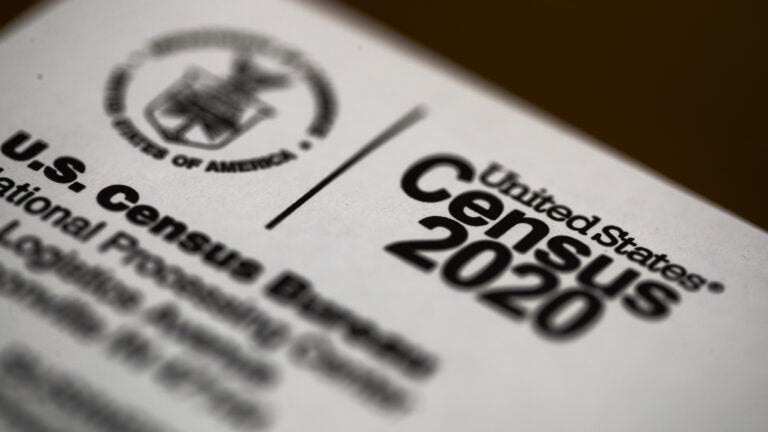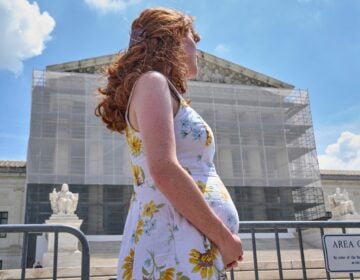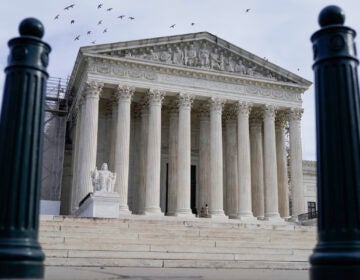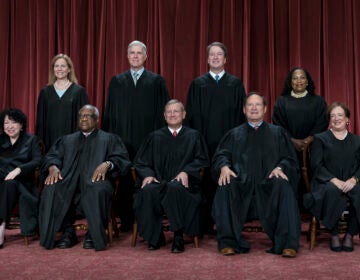‘Do not wait’: Philly urges residents to take the census as Supreme Court stops the count
Philly’s census organizers are urging residents to take the census now before the online portal is turned off following Tuesday’s Supreme Court ruling.

The 2020 census form. (Matt Rourke/AP Photo)
Updated 5:05 p.m. Wednesday
The census portal will remain available through 5:59 a.m. EST on Oct. 16. Phone response will be available through its regularly scheduled time on Oct. 15 — 7 a.m. through 2 a.m. Paper forms must be postmarked Oct. 15 to count. Door knocking operating will also end on that day.
The U.S. Supreme Court on Tuesday stopped the once-a-decade head count of every U.S. resident from continuing through the end of October. It’s unclear, however, just when the counting officially stops.
Stephanie Reid, executive director of Philly Counts, the organization tasked with census outreach in the city, is urging people to fill out the form as soon as possible.
“Do not wait another minute, do not wait another hour. You should go to 2020census.gov and complete the census,” said Reid. “At any moment, the portal could be turned off. We don’t know when they’re going to do that, so the time is now.”
So far, only 56.4% of Philadelphians have answered the questionnaire, which will determine federal funding for schools, hospitals and other public services. That’s a six-point drop from Philly’s 2010 response. For Pennsylvania, that means losing out on $21,000 over the next decade for every person who doesn’t fill out the form, which could have negative implications for Philadelphia with its high poverty rate. Also at stake is how U.S. House seats are redistributed in the apportionment process.
President Donald Trump’s administration had asked the nation’s high court to suspend a district court’s order permitting the 2020 census to continue through the end of the month. The Trump administration argued that the headcount needed to end immediately so the U.S. Census Bureau had enough time to crunch the numbers before a congressionally mandated year-end deadline for turning in figures used for deciding how many congressional seats each state gets.
A coalition of local governments and civil rights groups had sued the Trump administration, arguing that minorities and others in hard-to-count communities would be missed if the count ended early. They said the census schedule was cut short to accommodate a July order from Trump that would exclude people in the country illegally from the numbers used to decide how many congressional seats each state gets.
Associate Justice Sonia Sotomayor dissented.
“Moreover, meeting the deadline at the expense of the accuracy of the census is not a cost worth paying, especially when the Government has failed to show why it could not bear the lesser cost of expending more resources to meet the deadline or continuing its prior efforts to seek an extension from Congress,” Sotomayor wrote.
Last month, U.S. District Judge Lucy Koh in San Jose, California sided with the plaintiffs and issued an injunction which suspended a Sept. 30 deadline for finishing the 2020 census and a Dec. 31 deadline for submitting numbers used to determine how many congressional seats each state gets — a process known as apportionment. That caused the deadlines to revert back to a previous Census Bureau plan that had field operations ending Oct. 31 and the reporting of apportionment figures at the end of April 2021.
When the Census Bureau, and the Commerce Department, which oversees the statistical agency, picked an Oct. 5 end date, Koh struck that down too, accusing officials of “lurching from one hasty, unexplained plan to the next … and undermining the credibility of the Census Bureau and the 2020 Census.”
An appellate court panel upheld Koh’s order allowing the census to continue through October but struck down the part that suspended the Dec. 31 deadline for turning in apportionment numbers. The panel of three appellate judges said that just because the year-end deadline is impossible to meet doesn’t mean the court should require the Census Bureau to miss it.
With plans for the count hampered by the pandemic, the Census Bureau in April had proposed extending the deadline for finishing the count from the end of July to the end of October and pushing the apportionment deadline from Dec. 31 to next April. The proposal to extend the apportionment deadline passed the Democratic-controlled House, but the Republican-controlled Senate didn’t take up the request. Then, in late July and early August, bureau officials shortened the count schedule by a month so that it would finish at the end of September.
The Republicans’ inaction coincided with a July order from Trump directing the Census Bureau to have the apportionment count exclude people who are in the country illegally. The order was later ruled unlawful by a panel of three district judges in New York, but the Trump administration is appealing that case to the Supreme Court.
By sticking to the Dec. 31 deadline, control of the apportionment count would remain in the hands of the Trump administration no matter who wins the presidential election next month.
In Philadelphia and other cities seeing a lag in response rates, activists and city-led committees have been pushing outreach efforts into overdrive amid constantly changing deadlines.
Reid, who had outreach efforts planned in low-response neighborhoods through the end of October, said she doesn’t know what the plan for her office is come Wednesday.
“We are waiting for further guidance as people are reading this decision,” she said.
WHYY’s Ximena Conde contributed reporting.
Correction: This story has been updated to reflect the accurate time that the census online portal will shut down.

Your go-to election coverage
WHYY is your source for fact-based, in-depth journalism and information. As a nonprofit organization, we rely on financial support from readers like you. Please give today.





